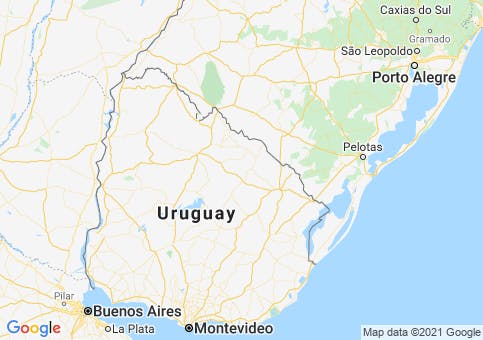by David Hammond
I moved from the U.S. to Uruguay in 2006. I came for the landscape, the culture, the food, and broadly, the opportunity to live a simpler life. Getting a healthcare plan was an afterthought. But now, as I get older, my healthcare plan is maybe the thing I appreciate most about Uruguay.
Healthcare in Uruguay offers several fantastic benefits as opposed to the system in the U.S., such as significantly more affordable rates, a greater emphasis on early diagnosis and prevention, as well as predictable, and easy-to-understand billing.
When it comes to the type of health care plans available in Uruguay, you have a multitude of options to cater to your individual needs and budget. These include:
Private membership plans called mutualistas (Used by about 57% of the population.)
Uruguay’s public healthcare system (Used by roughly 39% of the population.)
Private premium-service membership plans (Used by a little more than 2% of population.)
Third-party payer (U.S.-style) health insurance plans (Used by a little less than 2%.)
Mutualistas–Private Membership Plans
A mutualista is a private hospital-based healthcare organization, which provides medical services to its enrolled members. As a mutualista member, you can go to any of the mutualista’s hospitals or clinics for all your medical needs. This includes routine doctor visits, tests, procedures, surgeries, and emergencies.
As they’re utilized by over half of the population, you’ll find mutualistas spread across Uruguay. The largest of them are headquartered in Montevideo, the country’s capital. (Half of Uruguay’s population lives in and near Montevideo.)
One of the most favored mutualistas among expats is Asociación Española. It’s the second-largest in Uruguay, serving more than 190,000 members.
Its main hospital in Montevideo fills more than a dozen buildings. Its many clinics and satellite locations are dispersed throughout Montevideo and beyond, including a facility in the popular beach city of Punta del Este.
Each mutualista sets its own acceptance guidelines for age and pre-existing conditions. For example, Asociación Española’s age limit for accepting new members is 65. But it sometimes accepts new members older than 65 in exchange for a one-time fee. The fee, which can be thousands of dollars, loosely equates to back payments. Then, once you are accepted as a member—you’re in.
If you can’t get accepted at Asociación Española because of age, you might try Medica Uruguay. It’s the largest mutualista in Uruguay, with a history of accepting new non-employed members in their 70s.
Most mutualistas don’t include emergency response and ambulance service, non-emergency optometry, non-emergency dentistry, and psychotherapy. (Some do include emergency response, ambulance service, and dentistry for children.)
The monthly cost for non-employed members (such as retired expats) who pay their fee directly to a mutualista is around $70. Additional costs include copayments for services and fees for medications.
Following are samples of Asociación Española copayments.
Consultation with a general practitioner - $5
Consultation with a specialist - $10
X-ray or blood test - $17
Emergency room consultation - $25
NMR or CT scan - $26
(Above rates are converted from Uruguayan pesos to their equivalent value in U.S. dollars at the time of publication.)
Uruguay’s Public Healthcare System (ASSE)
Uruguay’s public healthcare system is called ASSE, which stands for Administracion de los Servicios de Salud del Estado (Administration of State Health Services). About half of the hospitals in Uruguay are ASSE hospitals, and are available to all legal residents.
As mentioned, ASSE is the default healthcare provider for Uruguayan workers, and ASSE also provides free care for unemployed residents with low incomes.
Retired expats in Uruguay who’ve become legal residents can get full coverage with ASSE at around $70 per month. And unlike a mutualista, no co-payment is required.
One of the major downsides to the ASSE system, as opposed to the mutualista, are the waiting times to make an appointment and to see a doctor. It’ll take you far longer to get an appointment in the public system. And, if you’re hospitalized, you may share a no-frills room with many others.
While most expats join a mutualista, some choose to enroll in ASSE. They may do so in Montevideo as a path to use the Hospital de Clínicas, the university training hospital. In addition to doctors in training, Hospital de Clínicas is where you’ll find top experts for a particular disease or condition. Doctors here can also access specialty medications not available elsewhere.
Hospital de Clínicas is not part of ASSE. But you can get access via an ASSE doctor referral or the hospital’s emergency room. And as an ASSE member, your expenses for treatment at Hospital de Clínicas are reimbursed by ASSE. So, you incur no additional cost.
Private Hospitals
You will find a few private premium-service hospitals in Montevideo. They offer pleasant surroundings and the highest degree of personal attention.
The most renowned is the British Hospital, with two locations in Montevideo. The British Hospital provides services to
Patients can pay for medical services out of pocket.
Those with third-party health or travel insurance to cover their costs.
Members of its own unique hospital membership plan called the “Hospital Scheme.”
Hospital Scheme applicants must undergo a screening process that includes an ultrasound and a blood test. The normal cutoff age for accepting new members at the British Hospital is 60.
Another private hospital with a good reputation is Seguro Americano, and it also offers its own membership plans at rates similar to the British Hospital. The difference is retired expats over 60 and 65 who pass their medical screening are often accepted as members.
Rates for the Hospital Scheme range from $325 to $400+ per month, depending on your age and when you became a member. It’s worth noting that premium-care hospital plans do not generally include non-emergency optometry, non-emergency dentistry, or psychologist visits.
Third-Party Payer Health Insurance
In Uruguay, you’ll also find private health insurance companies offering a variety of policy options, similar to the U.S. model.
Private insurers in Uruguay include
Rates for this type of health insurance are significantly more than mutualistas. And some options are higher than premium-service membership plans.
So, why would someone choose this type of insurance? Let alone pay more for it?
One reason is for greater choice. If cost is not an issue, this type of insurance provides the greatest choice of doctors and clinics. And coverage includes hospitalization at the British Hospital.
Also, both of these insurers provide an option that others do not—personal and corporate healthcare plans, which cover you in both Uruguay and next-door Argentina. So, many individuals and companies with cross-border business can be covered in two countries with one plan.
BlueCross and BlueShield Uruguay also offer a plan that’s good across Uruguay, Argentina, and the U.S. While it includes a large deductible ($10,000) it can make sense for regional business representatives, who need to also spend time at their international company’s U.S. headquarters.
Like other private options, these insurance companies set their own acceptance guidelines for age and pre-existing conditions.
Uruguay's Quality of Care
Many Uruguayans are descendants of European immigrants who brought their hospital traditions with them. For example, the British Hospital was founded in Montevideo in 1857. And Asociación Española, initially called the Spanish Hospital, opened its doors in 1853.
Today, Asociación Española is known for its investment in modern equipment. Its cardiac center includes a state-of-the-art heart surgery facility. And it offers calcium-scoring tomography to assess heart attack risk.
At Asociación Española, you also find a cutting-edge robotic microscope for neurosurgical procedures. It’s the only one of its type in South America. (You’d need to go to Panama or the U.S. to find another with its capabilities.)
Many U.S. and UK expats living in Uruguay report receiving much more care regarding screenings and tests to catch potential health concerns early. And then to follow up any findings of concern with “controls”--periodic follow-up tests to identify changes.
Except for the small copayment, many tests are included in the cost of a plan. Also, many walk-in clinics offer a wide range of health tests at low prices.
Besides saving money, a health care plan in Uruguay can provide greater peace of mind compared to the U.S.
For example, when I had private health insurance in the U.S., my policy included a large deductible, exclusions, a lifetime cap, and other policy terms that often changed.
And when I received medical services in the U.S., the doctor bills, lab bills, and hospital bills were unclear. On top of that, interactions with my insurance company were often stressful.
In Uruguay, my healthcare plan is simple. I don’t have to keep track of tricky terms, and I don’t need to decipher complicated billing statements. And I don’t need to interact with third-party payers, like an insurance company.
Medications
In Uruguay, you’ll find a wide range of commonly prescribed drugs. (The country has its own reputable labs that produce trustworthy generic medications.) However, with some medications, you won’t find as wide of a selection of dosages as you do in the U.S. And some specialty and experimental drugs are only available through Hospital de Clinicas.
In Uruguay, you need a prescription for antibiotics, corticosteroids, psychotropics, and narcotics. You can buy most other types of drugs without a prescription at a pharmacy, although most people get a prescription for all their medications anyway, and that’s because of the discounts on medications they can get through their healthcare plan.
For example, general medications for members at Asociacion Española are about $10. Some types of medications are further discounted. For example, some antihypertensive drugs are capped at $5. And prescriptions for some antipsychotic and glycemic-regulating drugs are provided to members for about $1.
ASSE, the public healthcare system, provides necessary medications at no charge.
The British Hospital and Seguro Americano provide their members with deeply discounted rates on most medications. They also offer optional prescription plans that provide any prescription that becomes needed at any time in the future for one low set price.
If your medications are stolen/lost, call the phone number for assistance listed in your travel insurance policy. Your insurer’s assistance service can often make calls on your behalf and tell you how to proceed.
Note: To enter Uruguay as a traveler, you must show proof of a travel insurance policy covering medical emergencies. (Since you’re required to have it, you might as well use it.)
Another option is to contact a relocation service in Uruguay and explain your situation. They may be able to connect you with a local English-speaking doctor to help with a prescription.
To help others help you:
Bring a letter from your doctor explaining your medical condition and the medications you are taking for it.
Keep ready access to the contact information for your doctor back home, copies of your current prescriptions, and your health insurance company.
Emergency Services in Uruguay
ASSE hospitals, mutualista hospitals, and premium-service hospitals across the country provide emergency room service.
To get emergency care at home or an ambulance ride to a hospital, many get a separate emergency-response-and-ambulance plan. It’s a private 24-hour service that will send you an ambulance with a doctor if you have an emergency.
Popular emergency services in Montevideo include
Española Móvil, associated with Asociación Española.
SUAT and UCM also provide a network of walk-in clinics.
In the popular beach town of Punta del Este, you find
La Emergencia.(32MV+C3R, 20005 Maldonado)
Emergency mobile coverage often costs between $25 and $40 per month.
What About the Language Barrier?
To get signed up with a health plan, you’ll find reputable bilingual relocation consultants who can explain the details, guide you through the process, and show you how it all works.
At the British Hospital, about 25% of the doctors and staff speak English, including English-speaking operators setting up appointments by phone.
However, at most other hospital organizations in Uruguay, the percentage of doctors and hospital staff that speak English is less.
With that said, most hospital organizations have some English-speaking doctors. And many expats find them by asking other expats in the same hospital plan.
Regarding appointments, at Asociación Española, appointments can be made online. Some expats just starting to learn Spanish make appointments using Google Translate on their home computers.
Others go to their nearest Asociación Española clinic to make an appointment in person using the help of a bilingual friend or a translator phone app.
Conclusion
Uruguay is not a medical tourism destination where people go for low-cost, one-time treatments and procedures. The stand-out value is long-term healthcare plans for locals and expats living in Uruguay.
The most popular healthcare option among expats in Uruguay, by far, is a private comprehensive plan called a mutualista—a mutualista costs around $70 per month, plus reasonable copayments when services are received.
The public health care system, called ASSE, is available to all legal residents. For retired expats, the cost is the same as a mutualista. With ASSE, you don’t need to make copayments.
Private premium-service healthcare plans offer greater convenience and personal attention at a cost from $325 to $400+ per month, plus copayments.
Private emergency response and ambulance service is available for between $25 and $40 per month. Many expats get this type of plan to supplement their mutualista.
A relocation consultant with a good understanding of the various healthcare options can help match you with the best option for your individual circumstances and budget. They can also help sign you up for a plan and provide an orientation on how to use the system.
One long-time relocation consultant with a good understanding of medical plans is Ana Inés Pérez at Expat UY.













